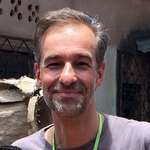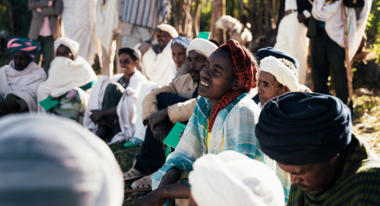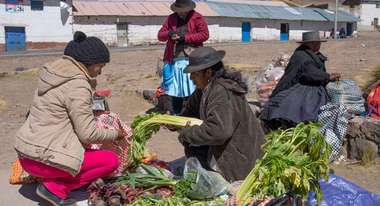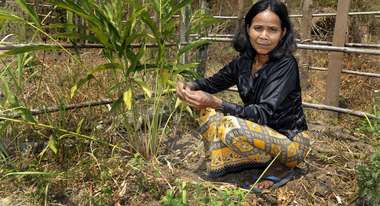Getting the Ball Rolling for Peace
A visitor bringing a ball to Bangui kicked off an idea: the “Football School for Peace”, where young people learn to overcome violence, hate, and intolerance with tolerance, fair play, and team spirit. Journalist Bernd Klose tells about the inspiring project.

When I talk about the Central African Republic, I find that this country is a blank spot on the map for many people. Is it really an independent country? Will I have heard of any of its cities? The conversation soon turns to the difficulties people face there: great poverty amidst plentiful natural resources; hunger despite favourable climatic conditions; and problems caused by corruption, violence, and destructive feuds. Four years ago, Welthungerhilfe invited me, in my capacity as reporter for Radio Bremen, to cover aid projects in this country, a land that regularly finds itself at or near the bottom of the United Nations’ Human Development Index. I was impressed by what the country coordinator at the time, Georg Dörken, and his team were accomplishing there.
“Do Children Play Football There Too?”
A fifth of the country’s population was on the run from brutal militias, with many people fleeing to a refugee camp that formed right next to the airport serving the country’s capital city, Bangui. Tens of thousands of people sought refuge there when the situation was at its most desperate. During my first visit I saw a lot of children: despite poverty, a high incidence of AIDS, and significant rates of child mortality, the Central African Republic is a young country. I myself have a son who is now 13 years old. When I was planning my trip back then, he asked me if the children in Africa played football too. We forwarded this question to Georg Dörken via email, and he answered: “Yes, if they have a ball.”
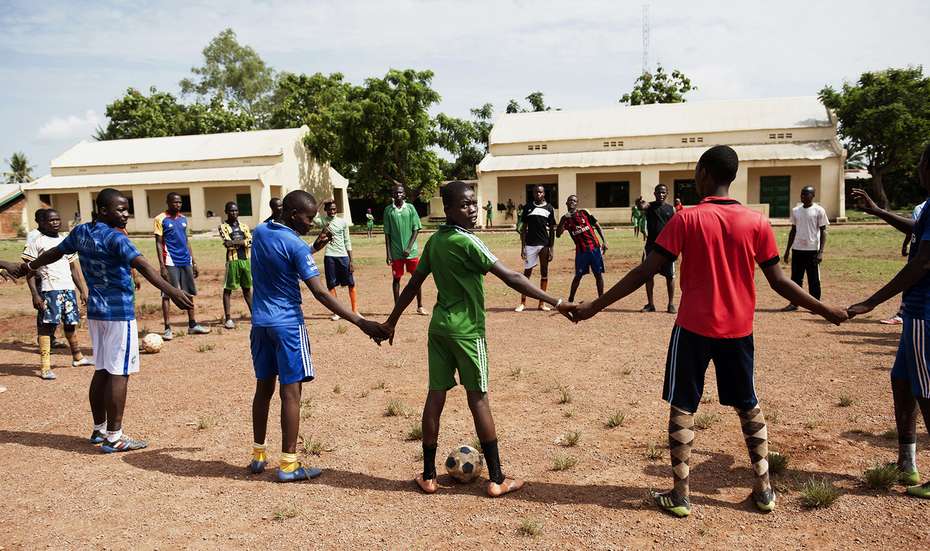
My son bought a ball from his pocket money and I took it to Bangui. Georg Dörken and I began talking about establishing a small football ground so that the children would have a modest place to play, right by some small houses and a market building that were scheduled for construction as part of the resettlement process Welthungerhilfe was supporting.
From A Football Pitch To The Football School For Peace
I was reminded of Willi Lemke, who was the special adviser for sport to the secretary general of the United Nations at the time. He lives in Bremen and has written a book in German, the title of which translates to: “A Football Ground for Bouaké: How Sport Changes the World and Why I Stay Strong for the Weak”. We thought: Why not a football ground for Bangui? I put my son’s ball aside so that it could someday be used to kick off a small inaugural match. After my return to Germany, I received an email from Simplice, one of Welthungerhilfe’s local employees in Bangui. It was written in German. Translated into English, it read: “Bernd, I think you are one of the people who won’t forget about us down here.”
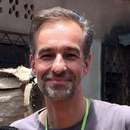
Those who have learned that the community is ultimately more important than the individual strengthen the foundations of society.
Bernd Klose JournalistI made an appointment with Willi Lemke, and he encouraged us to think bigger. And so we did: Rather than only a football pitch, it should be a football school. A football school for peace. We soon realised that it was about more than just football; it was about the values imparted by the sport: tolerance, respect, and community. Anyone actively engaged in the community gets to train in the football school as a reward, because those who have learned that the community is ultimately more important than the individual strengthen the foundations of society.
Advocates And Partners For A Powerful Idea
Four years have passed since then. During this time, Georg Dörken championed the idea of the football school with great idealism and determination. He first brought Welthungerhilfe on board. Then he found a local partner in Les Frères Centrafricains. The president of this non-governmental organisation, Anatole Koue, was a football legend in central Africa and is recognised today as a peacemaker by Christians and Muslims alike. He was lined up to head the football school. He told Georg Dörken in Bangui that this would fulfil his lifelong dream. Unfortunately, Anatole died from unknown causes at the turn of the year. Anatole's brother, Robert Koue, will now assume leadership of the school. Standing at Anatole's grave, I listened to Robert's prayers and will never forget them.
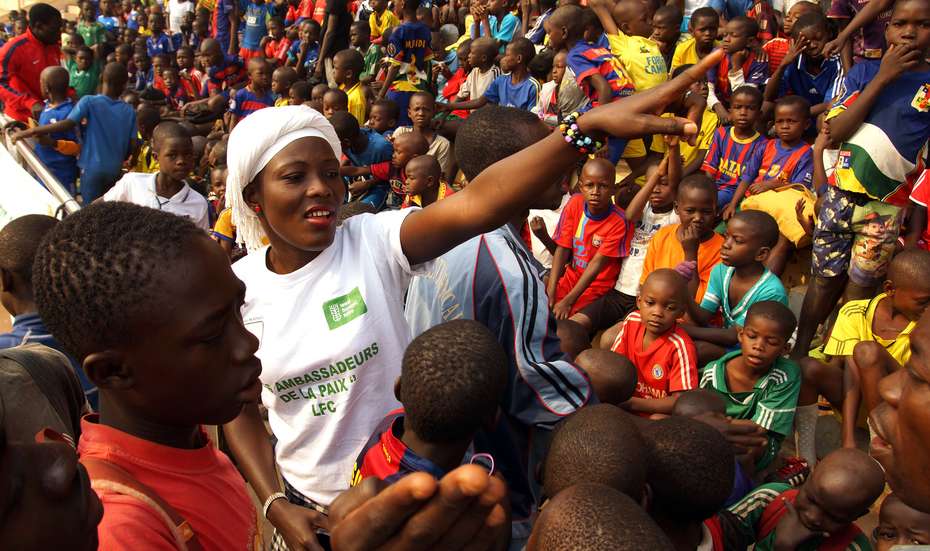
Despite Anatole's death, which was a big setback for the project, Georg Dörken did not give up. He convinced the German government to support the project, and a cooperation with the German football association, DFB, was also under development. Werder Bremen’s president, Hubertus Hess-Grundewald, agreed to collaborate and donated a significant number of balls and jerseys to the football school. In Bangui, radio announcements encouraged people to apply to the football school. Try-outs were held in the stadium in Bangui, with hundreds of children coming to show off their skills. Some 130 were chosen—Christians and Muslims, boys and girls. The plan is to eventually enrol more than 1,000 children. The Fatima School in Bangui, which was being rebuilt by Welthungerhilfe at the time, was selected as the location for the football school.
Naomi's Dream: To Play For The National Team
In the midst of Bangui live Naomi, Lukas, and Israel. After school, Naomi sells small fritters; Lukas sells coffee that he pours from a large tin pot into dented enamel cups; and Israel helps his father work an ancient sewing machine. They have all earned a place in the Football School for Peace. Naomi sums up the idea behind the football school perfectly: She wants to learn to improve her life as a whole. She wants to play for the national women’s team and earn some money for her family, and when she has accomplished that, she wants to encourage other girls to follow her example. Her expression tells me that she means it.
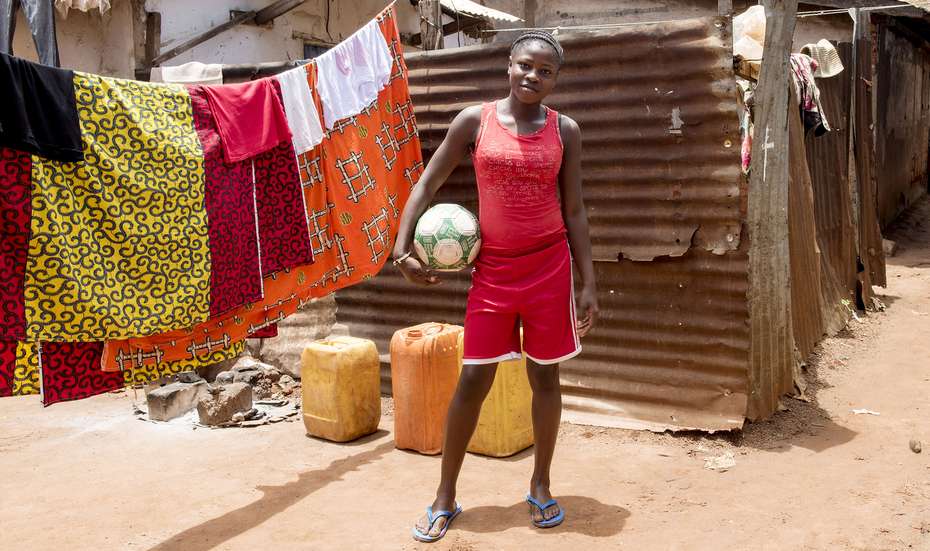
Friday, November 30, 2018, is a day of joy in Bangui. At the suggestion of the Government of the Central African Republic a grand opening ceremony of the Football School for Peace is held with representatives of the government and the major religions. Luckily, everything is peaceful, after some violent outbreaks just shortly before. Children in colorful jerseys line the pitch, hundreds of people are there to celebrate. The match kicks off. Children play a ten-minute opening game against Welthungerhilfe representatives. People are cheering, throwing their arms up in the air. Shortly before the final whistle, Israel shoots – and scores. Victory for the children. After the match, Georg Dörken gives a speech. When he talks about his friend Anatole Koue his voice becomes fragile. He is happy his friend's big dream has become fulfilled. The speech by the Minister of Youth and Sports, Silvère Simplice Ngarso, makes it official: The Football School for Peace is now open.
Where Do We Go from Here?
Now the Football School for Peace has to prove its sustainability. Georg Dörken knows that much remains to be done. We cannot take a naive approach to projects that receive tax funds from Germany and contributions from Welthungerhilfe’s donors. However, he also knows that going a new way takes a lot of time and many steps, and the first step towards the Football School for Peace has been made.
On the opening day, I heard children from Bangui sing their national anthem. In the end, everyone calls their country's slogan: "Unité, Dignité, Travaille" – unity, dignity, work. Maybe the football school for peace is a first step for them.




